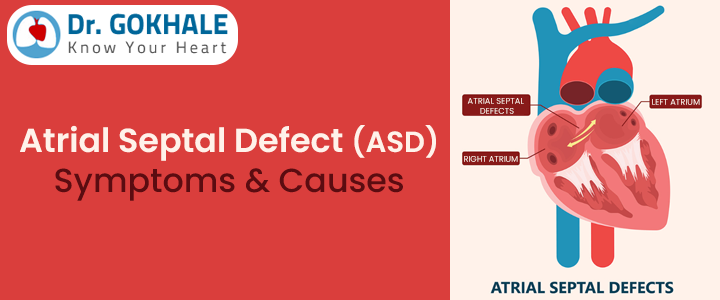Atrial Septal Defect is a congenital heart condition, commonly called a ‘hole in the heart’. The hole is formed in the muscular wall of the heart, called the ‘septum’ which separates the upper chambers of the heart. Given the wall separates the oxygenated blood and deoxygenated blood, the hole in the middle of the wall compromises its function.
The hole in the wall reduces the oxygen content in oxygenated blood and thus less oxygen reaches the human body. This manifests in the form of shortness of breath swelling of legs, heart strokes and in the case of larger holes, permanent damage to the lungs. Atrial Septal Defect is not a common condition and will need a consultation with an expert cardiologist at the earliest. Let us learn more about this serious heart condition from a leading heart transplant surgeon in Hyderabad, Padma Shri awardee Dr Gopala Krishna Gokhale in this blog today.
What Causes Atrial Septal Defect?
Atrial Septal Defect is not caused but a child is born with this condition at birth. According to Dr Alla Gopala Krishna Gokhale, every one of us is born with a hole in the heart (septum) which is a necessity during the foetal state.
Over time as the foetus grows the hole in the septum is filled up and becomes tiny in weeks resulting in a well-formed separation between the upper chambers of the heart. However, in a few cases, the wall is not adequately formed and leaves a hole, resulting in Atrial Septal Defect. Children who suffer from this condition are identified and treated well in their childhood, to prevent complications.
How does Atrial Septal Defect affect the heart and general health?
The hole in the septum ultimately leads to lower oxygen in the human body. Larger holes will direct a large volume of blood to the lungs, over time leading to permanent damage to the lungs. Some of the common symptoms of Atrial Septal Defect include:
- Shortness of breath
- Irregular heartbeat
- Fatigue & heart murmur
- Rapid pounding sensation of heart.
Smaller holes often do not cause problems in children as the heart and lungs are not stressed to work hard. Large holes are a bane to the heart and shall need prompt treatment from a heart specialist.
Can Atrial Septal Defect be treated?
Smaller holes will not need treatment as they naturally close by themselves and there is no medicine to pace up their closure. Larger holes can be surgically repaired using open heart or catheterization procedures. Usually, the surgical procedures to repair Atrial Septal defects are performed in childhood to prevent the further incidence of complications.
“The long term outlook of surgery for Atrial Septal Defect is excellent. Upon successful completion of the surgery, the patients will not be needing additional surgery and recover well without any symptoms. However post the surgery the patients will need regular examinations to form the cardiologist”, says the heart transplant surgery specialist and leading cardiologist in Hyderabad Dr Alla Gopala Krishna Gokhale.
If you are living in Hyderabad and are looking for a consultation, you can contact him here: 9603040506














